| Srl | Item |
| 1 |
ID:
130779
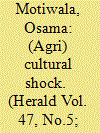

|
|
|
| 2 |
ID:
119980
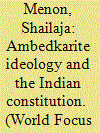

|
|
|
| 3 |
ID:
104730
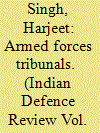

|
|
|
| 4 |
ID:
141523
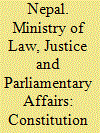

|
|
|
|
|
| Publication |
kathmandu, Law Books Management Board, 2015.
|
| Description |
252p.pbk
|
|
|
|
|
|
|
|
|
|
|
|
Copies: C:1/I:0,R:0,Q:0
Circulation
| Accession# | Call# | Current Location | Status | Policy | Location |
| 058357 | 342.05095496/NEP 058357 | Main | On Shelf | General | |
|
|
|
|
| 5 |
ID:
145541
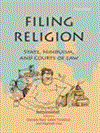

|
|
|
|
|
| Publication |
New Delhi, Oxford University Press, 2016.
|
| Description |
xlvi, 358p.hbk
|
| Standard Number |
9780199463794
|
|
|
|
|
|
|
|
|
|
|
|
Copies: C:1/I:0,R:0,Q:0
Circulation
| Accession# | Call# | Current Location | Status | Policy | Location |
| 058689 | 210.1/BER 058689 | Main | On Shelf | General | |
|
|
|
|
| 6 |
ID:
122441
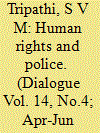

|
|
|
|
|
| Publication |
2013.
|
| Summary/Abstract |
Dignity of the individual was dear to the makers of our Constitution as
they had followed the torch lit by Mahatma Gandhi. All individuals,
especially the downtrodden, were considered as the manifestation of
Godhood by the Father of Nation. Consequently, in the very preamble
of our constitution, it was resolved to secure to all the citizens "Fraternity
assuring the dignity of the individual and the unity of the Nation." To
carry out this intention fully a number of fundamental rights were given
to individuals, some of them only bestowed on citizens of India. Barring
a few exceptions the fundamental rights function as limitation on the
State action. Sufficient provisions for protection against violation of
Human Rights by non-state players are incorporated in the ordinary
laws of the land. We have only to turn our eyes to some of our subcontinental neighbours to realize how important it is to protect the
individual against an unfettered State.
|
|
|
|
|
|
|
|
|
|
|
|
|
|
|
|
| 7 |
ID:
119964
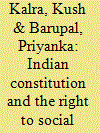

|
|
|
| 8 |
ID:
102037


|
|
|
|
|
| Publication |
2011.
|
| Summary/Abstract |
Studies of the post-colonial state have often presented it as a structure that has fallen under the control of self-interested sections of the Indian elite. In terms of citizenship, the failure of the state to do more to realize the egalitarian promise of the Fundamental Rights, set out in the Constitution of 1950, has often been attributed to interference by these powerful elite. Tracing the interplay between debates about Hindu property rights and popular support or tolerance for the notion of individual, liberal citizenship, this paper argues that the principles espoused in the Fundamental Rights were never neutral abstractions but, long before independence, were firmly embedded in the material world of late-colonial political relations. Thus, in certain key regards, the citizen-subject of the Indian Constitution was not the individual, freed from ascriptive categories of gender or religious identity, but firmly tied to the power structures of the community governed by Hindu law.
|
|
|
|
|
|
|
|
|
|
|
|
|
|
|
|
| 9 |
ID:
054000
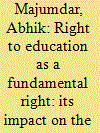

|
|
|
|
|
| Publication |
Jan-Mar 2004.
|
|
|
|
|
|
|
|
|
|
|
|
|
|
|
|
| 10 |
ID:
092199
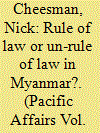

|
|
|
|
|
| Publication |
2009-2010.
|
| Summary/Abstract |
The rhetorical force of the rule of law is acknowledged through official discourse in Myanmar just as it is in other countries across Asia and around the world. Given that Myanmar manifestly does not conform to substantive models of the rule of law, which are associated with democratic government and individual liberties, might it conform to a minimalist one? Is there in Myanmar a thin rule of law to which the military government can lay claim, one compatible even with grave abuses of human rights? Or is there only "un-rule of law"? Beginning with some theoretical concerns, this article passes briefly through a review of law and rule-of-law rhetoric in the country's modern history before arriving at the present day. It recounts a court case arising from a recent historic event, the September 2007 antigovernment protests, to query whether or not a thin rule of law can, in Myanmar at least, be said to coexist with authoritarian rule. It concludes that it cannot. But if the army in Myanmar has succeeded in overwhelming the courts at cost of the rule of law, ironically in doing this it may also have averted a worse scenario, one in which the denial of fundamental rights for which it is well known could be even greater than at present.
|
|
|
|
|
|
|
|
|
|
|
|
|
|
|
|
| 11 |
ID:
127106


|
|
|
| 12 |
ID:
119983
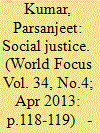

|
|
|
| 13 |
ID:
119978


|
|
|
| 14 |
ID:
098067


|
|
|
| 15 |
ID:
138417
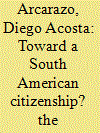

|
|
|
|
|
| Summary/Abstract |
Migration law may be discussed as an example of a clash between two central contradictory globalization processes: first, the transformation of political membership through new forms of quasi-citizenship and their impact for traditional understandings of identity and belonging in the national polity, and second, the securitization of migration and the attempt by the state to control its borders, considered as its “last bastion of sovereignty.” The outcome of this dispute results in conflicting mechanisms of inclusion and exclusion and in illiberal state practices, contrary to fundamental rights, with profound implications for the rule of law in Europe and elsewhere. South America has usually been neglected in academic debates on migration law. This is regretful for two main reasons: first, the development of new liberal ideas on migration in the region which challenge established assumptions on the regulation of migration in Europe, the United States, and elsewhere, and second, the parallel establishment of a South American citizenship. This article will look at this aspect, in particular the Mercosur Residence Agreement, which establishes a free movement of people regime in South America. Its drawbacks and potential will be outlined before exploring possible future scenarios and their importance for other regions, including the European Union (EU).
|
|
|
|
|
|
|
|
|
|
|
|
|
|
|
|
| 16 |
ID:
112743


|
|
|
|
|
| Publication |
2012.
|
| Summary/Abstract |
Although the Preamble of the Constitution proclaims that 'We the People' have solemnly adopted and enacted it, there is almost no further mention of 'the people' in the constitutional text itself. Asking who are 'the people' in whose name the Indian Constitution was drafted, this article re-examines the Constituent Assembly Debates (CAD) and highlights the fragmented image of 'the people' as a multivocal, multivalent reflection of imaginations and expectations attributed to people within and behind the Constituent Assembly. It becomes obvious that the aspirations of the actual Constitution makers find clearer expression in the constitutional text than the perceptions of 'the people' in whose name such law making takes place. Using the lens of the social revolution that the Constitution was to bring about, the article clarifies the implications of this multiplicity of visions, distinguishing 'We the People' seeking to claim such unfulfilled constitutional promises today, on the one hand, and the functionaries obligated to translate constitutional promises into reality and to enforce them, on the other. Asking why it is that the ambitions of the latter find clearer expression in the constitutional text than those of the former, the article also poses deeper questions about representativeness of political institutions and about the strength and depth of Indian social reform agenda.
|
|
|
|
|
|
|
|
|
|
|
|
|
|
|
|
| 17 |
ID:
097535


|
|
|
| 18 |
ID:
044062
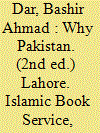

|
|
|
|
|
| Edition |
2nd ed.
|
| Publication |
Lahore, ISlamic Book service, 1978.
|
| Description |
xxi, 148p.hbk
|
|
|
|
|
|
|
|
|
|
|
|
Copies: C:1/I:0,R:0,Q:0
Circulation
| Accession# | Call# | Current Location | Status | Policy | Location |
| 030162 | 954.9/DAR 030162 | Main | On Shelf | General | |
|
|
|
|